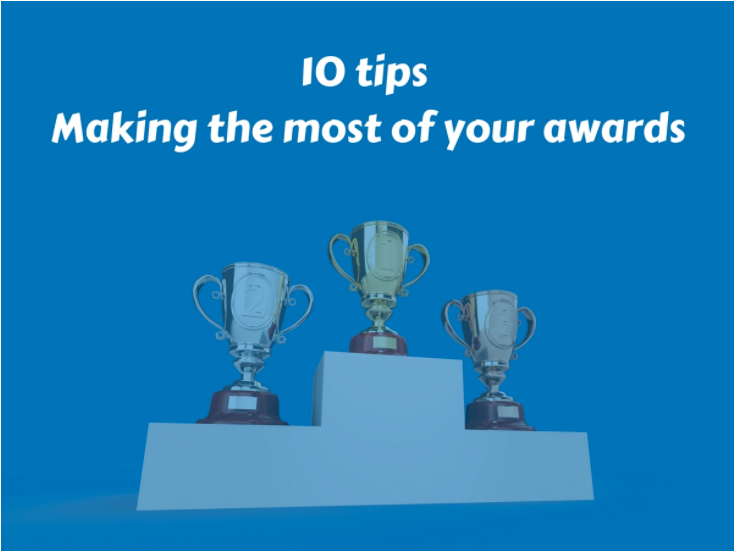

Awards are a great way to build your profile & reputation. But how do you make sure that you maximise the benefit from the awards you enter and, hopefully win?
Awards are great. There are so many ways that they can have a positive effect on your business. They will help you raise your profile and build your brand reputation.
They will reinforce to your people that they have backed the right horse and will improve staff retention. They’ll attract new potential funders and investors for your business. But now more than ever the sheer volume of awards makes your selection process even more critical.
So how do you ensure that you capitalise on the marketing opportunity that awards present without wasting time completing applications that are of no benefit to you or your organisation?
Here are a few tips on how to filter your list of potential award entries down to a manageable number.
1 – Understand your objective
The first stage is understanding what you are trying to achieve. Different awards will offer different benefits for your organisation. If your objective is local recruitment then your local Chamber of Commerce Awards are worth a look.
If you’re trying to build awareness of your company in a new market then look at awards being organised by a relevant brand. An example is the Deloitte Best Managed Companies Awards. These are run in several countries and with Deloitte being a recognised International brand being able to associate your name with theirs can give you leg up in new markets.
If you’re trying to attract funding or investment in your company then look for awards being run by local financial institutions. Success here will lead to other funders taking an interest in your business – and can also be a useful way to keep your bank manager on his toes by attracting new offers of business banking and export finance.
Your decision to enter any awards should not be based on a knee jerk reaction to the latest notification you have received. It should relate back to your overall business strategy. It’s only then will you enjoy the full benefit that awards can bring. Of course it’s nice to be asked to enter any awards but learning to say no to the wrong awards is the first part of being successful.
2 – Look at previous winners
Once you’ve identified some potential awards it’s now time to look at them in a bit more detail. Previous winners of the awards are generally published on the awards website so this will give you an idea of the kind of companies that have enjoyed success.
You can then benchmark yourself against the previous winners – have you got a stronger story than them? This process will also help you to identify what award categories are going to be best suited to your business – and ensure you avoid wasting time on an entry that has little or no chance of being successful.
3 – Know the organiser’s objectives
Every awards has an agenda so you need to understand what that agenda is and whether that will act as a help or a hindrance to your efforts. To be frank not all awards are created equal. I’m of the opinion that the more detailed the application process the better. This is evidence of an awards where winners are judged on business performance and merit rather than on who paid the best PR agency to put the application together.
4 – Examine the judging criteria
Almost every awards application form that I have ever across will include details of what the judges are looking for. Spend time looking at the criteria and detailing everything you do that meets the requirements. If you have selected a number of different award categories this will help you identify where you are able to put the strongest application together.
5 – Get contributions from across the organisation
While you will undoubtedly have a good idea of the subjects to be covered in your awards application you won’t have thought of everything. Ask for input from other people to ensure that you’ve covered all the bases. This doesn’t need to take a long time – a 1/2 hour workshop with a flip chart, markers and copies of the judging criteria will typically produce lots of new ideas about what you can highlight in your award entries.
6 – Talk to recent recruits
The people who have recently joined your company are a hugely valuable resource when putting together your award entries. They’re only very recently looking at everything from within and can therefore still give a useful external perspective on what impressed them either during the recruitment process or since they have joined the company.
7 – Give yourself time to write the entries yourself
If you’re in it to win it then the panicked writing of entries as you hurtle towards the submission deadline is not to be recommended. This simply leads to compromised entries where the priority has switched from putting the best possible entry together to simply meeting the deadline.
All the planning you have done in selecting the awards best suited to your company objectives will give you time to plan your submission writing effectively. I suggest that the entry you submit should be at least version 3 – and far too many entries are the first draft.
8 – Get the formatting right
Put yourself in the judges shoes – how would you deal with receiving 20+ award entry documents and a requirement to shortlist them to the top 3? It’s more than likely that your entry will be scanned for the relevant information and quick assessment made of the quality.
Make your entry easy to digest – make sure all your key points are highlighted in as concise a way as you possibly can. It’s also worth thinking about the strengths of the points you are making – some will undoubtedly be stronger than others. You can deal with this by starting strong and finishing strong for maximum impact while sandwiching the less strong points between them.
Having said that, if you think any part of your entry is weak then the judges will probably agree with you so be ruthless about what makes the final cut.
9 – Promote yourself
Once you’ve submitted your entry you need to make yourself known to the organisers. Show an interest in the timeframes for shortlists to be announced and the arrangements for the actual awards event.
Every awards you enter has a commercial element to it so any indication that you’re keen to exploit the opportunity presented by the awards will have an impact on the organisers.
10 – Give a bit back
Echoing the previous point, the awards organisers have costs to recover and financial targets to hit for the awards night. An early indication of a willingness to take a table at the awards won’t do you any harm and may improve your chances.
A demonstration for enthusiasm about the awards on all the relevant social media channels will help the organisers build the reputation of the awards. This will also be greatly appreciated by the awards organisers as they seek to promote the awards to as wide an audience as possible.
It’s also worth asking in advance about the availability of special awards logos for shortlisted companies and the winners. This indicates to the organisers that you won’t simply put the award on the shelf but will make the most of the PR opportunity presented by your involvement in the awards.
Grasp the marketing opportunity at every stage
Don’t wait until after the winners are announced to decide to release some PR on the event – because if you don’t win you haven’t got a story. If you’re shortlisted for any award there is a definite PR opportunity for you. If you’re lucky (good?) enough to win you’ll then get 2 PR opportunities from the same award.
There’s another marketing opportunity in the writing of your award entry – you’ll undoubtedly learn about things that your organisation does really well that you didn’t previously know about. Don’t leave this information in the award entry. Make sure you introduce it to your marketing materials – your website, brochures, proposals, videos.
To wrap up…
There are a lot of awards out there and it can be difficult to filter out all the noise and narrow your focus. It is however an exercise worth doing. Winning the right awards can deliver a wide range of benefits so good luck with your submissions. And if you need any help with any part of the process then you know where I am.